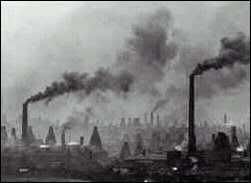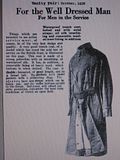Alan Eardley
One Too Many
- Messages
- 1,500
- Location
- Midlands, UK
Feraud,
English humour based on regional rivalry perhaps needs explanation, and doesn't 'travel well'. I was parodying the reaction of people to $1500 'label' garments currently being made in places like China. At the time that Thos. Burberry set up their factory there, Yorkshire was China in terms of the difference between the income of the workers making a product and the spending power of the customers buying it.
Rotherham is in South Yorkshire - an area once known affectionately as 'The People's Republic of South Yorkshire' for its fierce sense of independence and its strong socialist politics. When Margaret Thatcher announced that she had defeated 'the enemy without' (the Argentinians) and would now defeat the 'enemy within', she was referring mainly to the miners of the South Yorkshire coalfield (see Miner's Strike 1984) and other highly unionised workers. Now the steel, coal and clothing industries are derelict - see 'Brassed Off' and 'The Full Monty' (film version) for fictional parallels in the area. Now, instead of places like Rotherham, Doncaster and Sheffield, steel comes to the UK from Italy, coal from Poland and clothing from all over Asia.
Personally, I think that Burberry is to be praised for persisting in maintaining manufacturing bases in the UK (even if it has closed its Treorchy plant) though I suspect that only the 'ridiculously' high mark-up allows this. As an amateur researcher into industrial archeology, I am always fascinated by the relationship between the quality of the product and the characteristics and conditions in which it is made. I am from Stoke-on-Trent ('The Potteries') which was once described as 'an antiroom of Hell' (see photo') due to to its squalor, deprivation and industrial pollution - present-day Rotherham, by contrast, is quite pleasant.

And yet from such unpromising surroundings, from the hands of people who lived their lives only a little above poverty, almost inevitably facing an early death through industrial disease (my father was the first recorded male in our family to exceed 50 years of age) came works of ceramic art and beauty that rival the masterpieces of Meissen and Dresden. That is the magic of industry. Emperors have dined off the handywork of paupers, illiterates have exhibited skills that amaze and delight the connoisseur.
I hope that Burberry carries on making garments at Blyth and Rotherham. In my lifetime I have observed and been involved in the demise of whole industries. An outpost of long-standing local skill that continues to hold out against the blind trend towards cost-driven overseas outsourcing gets my support. Good on you, Burberry and Rotherham.
Alan
English humour based on regional rivalry perhaps needs explanation, and doesn't 'travel well'. I was parodying the reaction of people to $1500 'label' garments currently being made in places like China. At the time that Thos. Burberry set up their factory there, Yorkshire was China in terms of the difference between the income of the workers making a product and the spending power of the customers buying it.
Rotherham is in South Yorkshire - an area once known affectionately as 'The People's Republic of South Yorkshire' for its fierce sense of independence and its strong socialist politics. When Margaret Thatcher announced that she had defeated 'the enemy without' (the Argentinians) and would now defeat the 'enemy within', she was referring mainly to the miners of the South Yorkshire coalfield (see Miner's Strike 1984) and other highly unionised workers. Now the steel, coal and clothing industries are derelict - see 'Brassed Off' and 'The Full Monty' (film version) for fictional parallels in the area. Now, instead of places like Rotherham, Doncaster and Sheffield, steel comes to the UK from Italy, coal from Poland and clothing from all over Asia.
Personally, I think that Burberry is to be praised for persisting in maintaining manufacturing bases in the UK (even if it has closed its Treorchy plant) though I suspect that only the 'ridiculously' high mark-up allows this. As an amateur researcher into industrial archeology, I am always fascinated by the relationship between the quality of the product and the characteristics and conditions in which it is made. I am from Stoke-on-Trent ('The Potteries') which was once described as 'an antiroom of Hell' (see photo') due to to its squalor, deprivation and industrial pollution - present-day Rotherham, by contrast, is quite pleasant.

And yet from such unpromising surroundings, from the hands of people who lived their lives only a little above poverty, almost inevitably facing an early death through industrial disease (my father was the first recorded male in our family to exceed 50 years of age) came works of ceramic art and beauty that rival the masterpieces of Meissen and Dresden. That is the magic of industry. Emperors have dined off the handywork of paupers, illiterates have exhibited skills that amaze and delight the connoisseur.
I hope that Burberry carries on making garments at Blyth and Rotherham. In my lifetime I have observed and been involved in the demise of whole industries. An outpost of long-standing local skill that continues to hold out against the blind trend towards cost-driven overseas outsourcing gets my support. Good on you, Burberry and Rotherham.
Alan









